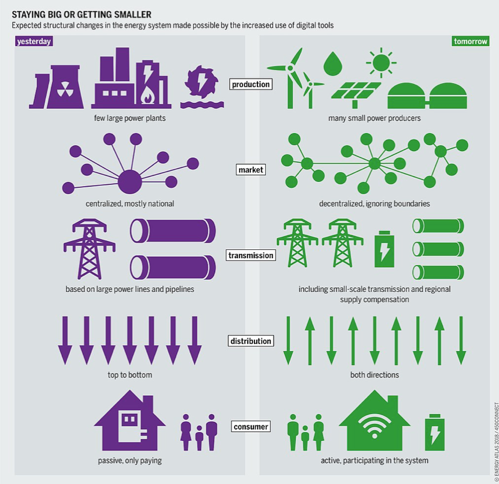energy->water->food->culture
Energy: ability to do work. units: Joules or calories
Power: how fast you do that work. units: Watt
Demo: walk/run uphill:
- mass (convert lbs to kg)
- work done: mgh = mass x 10 x 3
- work/time = power in Watts
- Watts/747 = hp
- calculate other power: double time, half time, double mass, half mass
- work done/4.18 = calories (humans are about 33% efficient, so multiply by three)
- 1000 cal = 1 food Calorie (1000 cal = 1 Cal)
Energy units:
Joule is defined by mechanical work (force of 1 Newton for one meter)
calorie is the heat energy needed to raise one gram of water by 1 °C
1 kcal = 1000 cal = 1 Cal (food calorie, note the capital letter)
kJ = 1000 J
4.18 J = 1 cal
Electricity: energy and power units:
Energy is in Joules
How fast the energy is used is power, in Watts
1 joule/second = 1 Watt (capital again, named after James Watt)
1 kW = 1000 W, or about the power used to run a toaster
energy is like amount of water (gallons, liters)
power is like flow (gal/minute, liters/second)
Try these:
100W bulb runs for 3 hours = 0.3 kWh
Huh? another unit?
Yes, power people are not so complex, so instead of using Joules (like they do in much of the world), we take an energy unit (Joules) divided by time (seconds), then multiply by time again (hours) to get energy. Pretty dumb.
Another calculation:
1.5 kW (1500 Watt) toaster runs for 2 hours. Electricity costs $0.50 per kWh. How much does this cost?
1.5 kW x 2 hours = 3 kWh, 3 kWh x $0.50 = $1.50
This really adds up if you have a 4.5 kW water heater running for 2 hours per day. How much would this cost?
Hot water demo:
- measure amount of water in hot water heater (tea maker)
- plug in, turn on, time to boiling
- measure Volts, Amps, Watts
- convert Watts to kW (divide by 1000)
- convert time to hours (divide minutes by 60)
- multiply kW x hours = kWh or energy used
- if power were 2x, how long would this take?
-------------homework questions-----------------Homework: energy 1.0
- Your home hot water heater uses energy at the rate of 4500 joules every second. How many kilowatts is this?
- If it is on for 3 hours each day, how many kiloWatt-hours (kWh) is this?
- If energy costs 40 cents for every kWh where you live, how much does this cost per day?
- How much per year?
- Why would a 100 kg person running up the stairs use more power than a 50 kg person if they did both in the same time?
- Why would twins of the same mass have different power numbers if one walked up the stairs and the second ran up?
- If Ella Finoe has mass 60 kg and runs up the stairs (3 meters) in 6 seconds, how much energy did Ella use?
- What was her power?
Back to energy:
In the US, energy is used for three things:
1/3 transport (usually using oil-gasoline or diesel, or kerosene for jet airplanes)
1/3 buildings (natural gas, heating oil, or electricity from coal or natural gas)
1/3 industry (same as above, more electricity though, and different time trends: 24x7 or 8 hours)
How can we change this?
Industry: factories, machines, pumps, furnaces
Natural gas: instead of coal for electricity. Why? This is rapidly changing because of fracking-more on this soon
Coal: mining, air pollution, water pollution, heavy metals, coal ash, CO2.
Natural gas: (methane, propane, butane, pentane etc.) has lower CO2 per Joule, lower Hg, no ash, no water pollution.
If it comes from fracking, then we have another issue (water pollution, toxic waste)
Transport: moving stuff around (cars, trucks, trains, airplanes)
Hybrid/electric vehicles, natural gas for trucking and train fleets (see same reasons as above).
Storage is key: must be mobile, and light for airplanes, fast recharge for cars
Question: why are electric trains in Europe, Japan and China so much greener?
Buildings: heating and cooling.
HVAC systems (Heating, Ventilation And Cooling) or heating/ventilation/air conditioning, depending on who you ask.
Very energy intensive, dependent on set points (thermostat), humidity, insulation, and air flow (ACH means something, look this up).
Conservation = 8x production $
HPA campus energy plan:
Three phases:
monitoring and conservation+harvesting+storage
One very rich dude bought up all of the trains in the US a few years ago, at the same time he bought up much of the natural gas resources. Why would he do this?
Another very rich oil dude sold all of his oil holdings and created huge networks of wind farms in Texas. Why would he do this? How old were these dudes? Why does this matter?
Smart Grid: https://en.wikipedia.org/wiki/Smart_grid

Harvesting the wind: community wind power in Minnesota
Energy for a developing world: solar power in Bangladesh
Paving the way: next generation cars
Growing energy: bioethanol in Brazil
State of resolve: California cars
Coal and nuclear: Next generation nuclear, coal
Comments